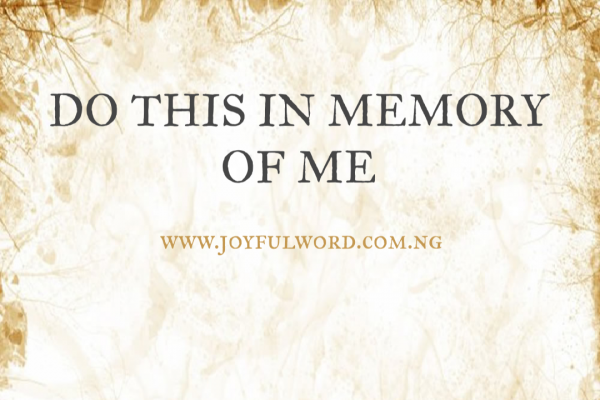DO THIS IN MEMORY OF ME(Exodus 12:1-8,11-14/Psalm 116:12-13,15-18/1 Corinthians 11:23-26)
DO THIS IN MEMORY OF ME(Exodus 12:1-8,11-14/Psalm 116:12-13,15-18/1 Corinthians 11:23-26)

DO THIS IN MEMORY OF ME
(Thursday, April 18 2019 Holy Thursday)
Today marks the beginning of Easter Triduum and Today’s celebration is highly indispensable in the life of the Church because the two important Sacraments in the life of the Church were born or rather instituted during the Last of the Lord: The Sacrament of the Most Holy Eucharist and Sacraments of the Holy Orders. No wonder today the Catholic priests around the world gather around their bishops to celebrate together and to renew their priestly promises and obedience to their bishops.
As far as the Church is concerned, these two Sacraments cannot be relegated to the background and the Church cannot do without them. This phrase after the institution of the Holy Eucharist by Christ is very important in the Institution of the Sacrament of the Holy Orders (Priesthood) “Do this in memory of Me” Memories are precious; they keep us connected to people, places, and events that have shaped us and influenced our lives. Tonight we begin the commemoration of the central events of our faith. The very heart of everything we believe as Catholics.
At the Last Supper Jesus shared a meal with His disciples and then led them in the ancient observance of the Feast of Unleavened Bread, or Passover. Jesus, the Master and Teacher, used this opportunity to plant an important memory in His disciples gathered in that upper room. Jesus shared this meal for their benefit and for ours. As Jesus raised the bread and the cup in thanksgiving, He added new significance to this ancient ritual. Luke 22 records that Jesus told His disciples to observe the Passover "in remembrance of me." Jesus took an old symbol and filled it with new meaning.
The meaning of Jesus' words and actions is rooted in His command to remember. As of today's disciples, we observe the Lord's Supper in remembrance of Christ. Some refer to this ordinance as the Memorial Supper to highlight the significance of Christ's atoning work on the cross and to call believers to remember His sacrificial death. Others call it Communion to highlight the Christian’s intimacy with Christ. Whatever we call this observance, one thing is clear: It is a time to remember. The Feast of Unleavened Bread is the historical background for the establishment of the Lord's Supper. Exodus 12 presents the final chapter in God's miraculous rescue of Israel from slavery in Egypt: the plague of the judgment of the firstborn. For the angel of death to pass over a household, a family had to put blood from a sacrificed lamb on the doorframe of their house and eat the Passover meal as the Lord had prescribed.
This lamb and the meal of unleavened bread became the abiding symbol of Israel's deliverance from bondage. We are reminded in the opening passage from Exodus, which is actually one of the most important passages in the entire Old Testament, that the Passover, which signaled the Deliverance of the children of Israel from slavery in Egypt, was a type and a prefigurement of the sacrifice of Christ. For just as God asked the children of Israel to sacrifice the best of their lambs, and eat with unleavened bread and bitter herbs, and just as He passed over their houses marked with blood, so Christ gave us His Own Body as the most perfect Passover Lamb, so that humanity could be delivered from slavery to sin, and have the ability to live in Union with God forever. As Jesus' disciples watched Jesus and listened to His words this Passover, they would have understood the historical significance of His actions. What they did not fully understand until after the Crucifixion and Resurrection, however, was the transformation of what had been a Jewish feast of remembrance into a new symbol for remembering Jesus' atoning sacrifice. The God who acted in history to deliver His people Israel has also acted in history to deliver us.
The elements used in the Supper are not the real body and blood of Jesus but His words at the Institution of the Holy Eucharist On this Last Meal with His disciples “This is my Body and This is my Blood” are powerful words that cause us to remember that Jesus really did suffer and die in a real, historical time and place. What Jesus did centuries ago turns out to be the center our Christian worship as Catholics and calls for sober reflection on the love God has for humanity especially by giving us His Only Son who left us a mystery so priceless and irreplaceable treasure In 1 Corinthians 11, St. Paul gives instructions concerning the Lord's Supper and in doing so reminds the Corinthian Christians of two things: their personal salvation in Christ and that participation in the Supper carries inward and outward aspects. Inwardly, participants are to examine themselves spiritually before taking the Supper (1Cor 11:27-28). Outwardly participants proclaim through the Supper the Lord's death until He returns (1Cor 11: 26).
Observing the Lord's Supper carries personal significance because Jesus calls us to remember that He gave His body "for us all." It also carries personal responsibility for us to participate with reverence, humility, and sincerity, understanding and proclaiming Christ's great act of love. St. Paul said that our observance of the Lord's Supper is to be done to help us to remember Christ. Saint Pope John Paul II writes about the priesthood originating during the Last Supper, “At the Last Supper we were born as priests…” (Letter to Priests for Holy Thursday 2004 §1). Then he continues to write about the connection between the priesthood and the Eucharist, saying that priests were born from the Eucharist, “We were born from the Eucharist. If we can truly say that the whole Church lives from the Eucharist, we can say the same thing about the ministerial priesthood: it is born, lives, works and bears fruit “from the Holy Eucharist” There can be no Eucharist without the priesthood, just as there can be no priesthood without the Eucharist.” (Letter to Priests for Holy Thursday 2004 §2).
No matter what type of good work a priest does the highpoint of the priest’s ministry is celebrating the Eucharist. Today is the most important moment of the day for the priests and for the whole Christian community in general. Let us avail ourselves the opportunity of receiving our Lord Jesus Christ today in the Most Holy Eucharist. Therefore, brothers and sisters as we celebrate today, let us thank Our Lord Jesus Christ for giving us the Eucharist and the priesthood. Both the Eucharist and the priesthood “were born” during the Last Supper and the two sacraments of the Eucharist and Holy Orders are so closely linked because without the priesthood we would have no Eucharist.
Let Us Pray: Lord Jesus, help me to continue to love you and to strive to be worthy to participate in the eucharistic banquet. Bless all the priest and give them grace of holiness. Amen.

